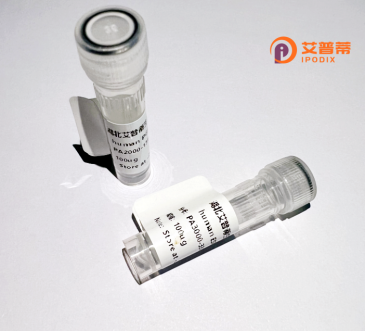
| 纯度 | >90%SDS-PAGE. |
| 种属 | Human |
| 靶点 | RAP2C |
| Uniprot No | Q9Y3L5 |
| 内毒素 | < 0.01EU/μg |
| 表达宿主 | E.coli |
| 表达区间 | 1-180 aa |
| 活性数据 | MREYKVVVLGSGGVGKSALTVQFVTGTFIEKYDPTIEDFYRKEIEVDSSPSVLEILDTAGTEQFASMRDLYIKNGQGFILVYSLVNQQSFQDIKPMRDQIVRVKRYEKVPLILVGNKVDLEPEREVMSSEGRALAQEWGCPFMETSAKSKSMVDELFAEIVRQMNYSSLPEKQDQCCTTC |
| 分子量 | 27.3 kDa |
| 蛋白标签 | His tag N-Terminus |
| 缓冲液 | PBS, pH7.4, containing 0.01% SKL, 1mM DTT, 5% Trehalose and Proclin300. |
| 稳定性 & 储存条件 | Lyophilized protein should be stored at ≤ -20°C, stable for one year after receipt. Reconstituted protein solution can be stored at 2-8°C for 2-7 days. Aliquots of reconstituted samples are stable at ≤ -20°C for 3 months. |
| 复溶 | Always centrifuge tubes before opening.Do not mix by vortex or pipetting. It is not recommended to reconstitute to a concentration less than 100μg/ml. Dissolve the lyophilized protein in distilled water. Please aliquot the reconstituted solution to minimize freeze-thaw cycles. |
以下是关于重组人RAP2C蛋白的3篇示例参考文献(注:文献为示例性质,需根据实际研究查阅数据库验证):
1. **文献名称**:*RAP2C promotes colorectal cancer progression by activating the MAPK signaling pathway*
**作者**:Liu Y, et al.
**摘要**:研究揭示了重组RAP2C蛋白通过激活MAPK通路促进结直肠癌细胞增殖和侵袭,表明其作为潜在治疗靶点的可能性。
2. **文献名称**:*Expression and functional characterization of recombinant human RAP2C in breast cancer metastasis*
**作者**:Wang X, et al.
**摘要**:通过体外重组表达RAP2C蛋白,发现其显著增强乳腺癌细胞迁移能力,并调控上皮-间质转化(EMT)相关标志物。
3. **文献名称**:*RAP2C interacts with Hippo-YAP pathway to regulate hepatocellular carcinoma growth*
**作者**:Chen L, et al.
**摘要**:研究利用重组RAP2C蛋白证实其与Hippo-YAP通路的相互作用,揭示其在肝细胞癌生长调控中的关键作用及分子机制。
(提示:实际文献需通过PubMed、Web of Science等数据库检索确认。)
Recombinant human RAP2C protein is a member of the RAP subfamily within the RAS-related small GTPase superfamily. Encoded by the RAP2C gene, this 19 kDa protein regulates diverse cellular processes by cycling between active GTP-bound and inactive GDP-bound states. Structurally, RAP2C shares conserved G domains with other RAS-like proteins but exhibits distinct C-terminal hypervariable regions that influence subcellular localization and effector interactions.
Functionally, RAP2C interacts with effectors like RADIL and TNIK, modulating pathways involved in cell adhesion, migration, and proliferation. It plays context-dependent roles in cancer progression, shown to promote metastasis in breast and gastric cancers by enhancing EMT (epithelial-mesenchymal transition) and activating Wnt/β-catenin signaling. Conversely, some studies suggest tumor-suppressive effects in colorectal cancer through Hippo pathway regulation.
Recombinant RAP2C is typically produced in E. coli or mammalian systems with tags (e.g., GST, His) for purification. Its applications include studying GTPase signaling mechanisms, screening small-molecule inhibitors, and exploring therapeutic strategies. Research gaps persist regarding tissue-specific functions, post-translational modifications, and isoform-specific interactions. Compared to homologs RAP1A and RAP2A, RAP2C shows unique spatiotemporal expression patterns, particularly in hematopoietic and epithelial tissues, warranting further investigation into its pathophysiological roles.
×